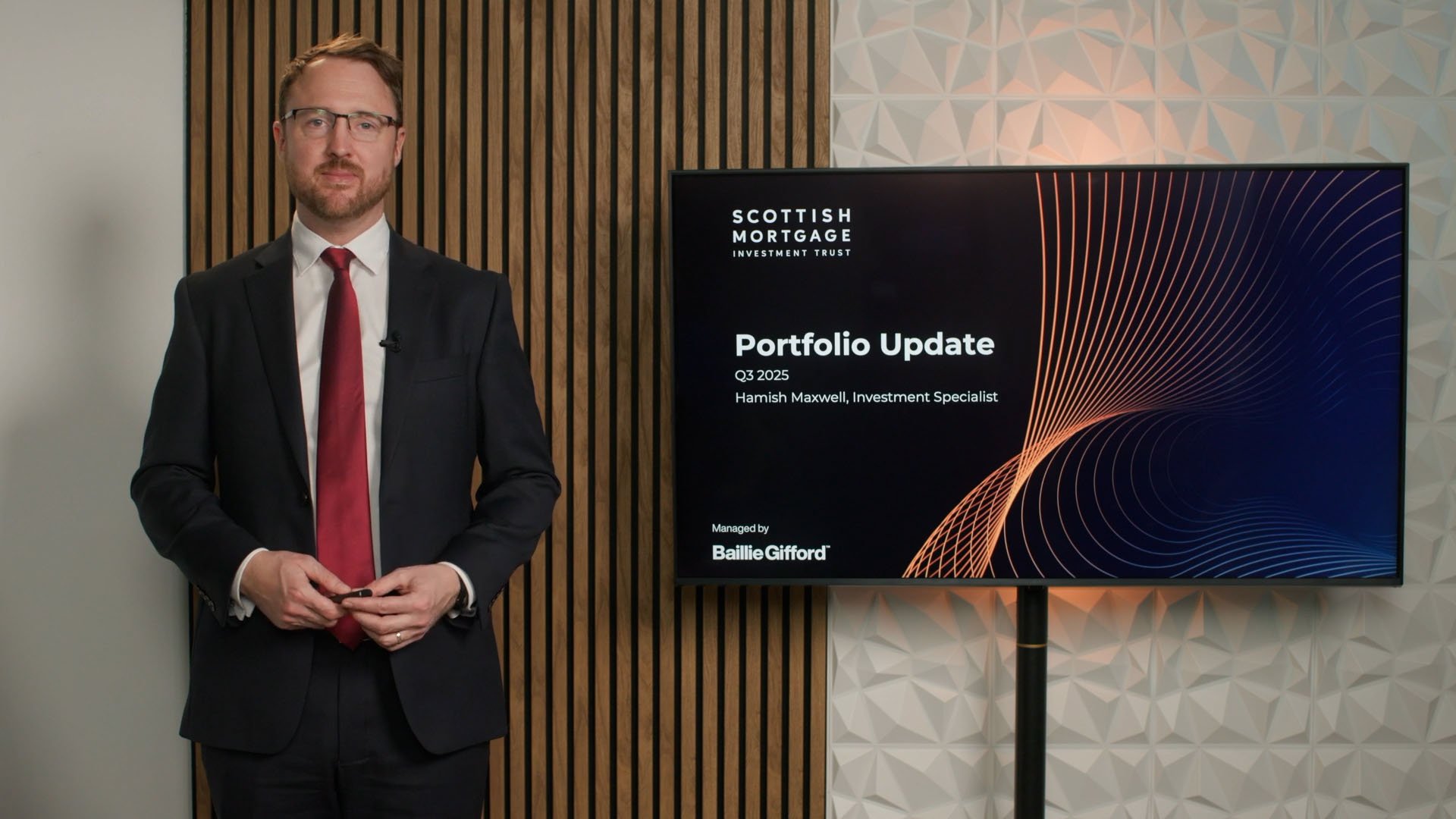AI: intelligence everywhere
Lawrence Burns – Investment manager
- Rapid improvements in data availability, computer processing power and machine learning techniques are fuelling progress in artificial intelligence
- The technology makes intelligence available to a broad range of products and industries
- Scottish Mortgage is invested in Tesla, Amazon, NVIDIA, Zalando and Ginkgo Bioworks

As with any investment, your capital is at risk. This article originally featured in Baillie Gifford's Spring 2024 issue of Trust magazine. Read all the articles here.
In 2018, I spent two days with Prof Brian Arthur, one of the world’s leading thinkers. He literally wrote the book on the nature of technology. During this time, he told me: “As a growth investor, you should be really interested in the developments in AI.”
I replied: “I completely agree. I think it is a new computing paradigm. In other words, the next big thing after the mobile internet era.” Brian looked at me and said: “Well, I think it’s the biggest thing since the Gutenberg printing press in the 15th century.”
In the medieval era, scribes painstakingly copied books by hand, and monasteries chained the works to desks to prevent the theft of the valuable tomes. But Gutenberg’s invention let people share information like never before. It democratised access to knowledge and, in doing so, powered the scientific revolution.
But where the printing press externalised information, AI is externalising intelligence and making it available around the world, instantly and on demand. The impact of intelligence is even greater than that of information. For us, AI is not a new industry but a tool with the potential to rearchitect every industry.
Technology’s trendlines
At Scottish Mortgage, we have long tried to step back from the noise of the financial markets. As Bill Clinton used to say, focus on the trendlines, not the headlines. To us, the trendlines that matter are the deep underlying changes in technology. They ultimately drive economic growth, human progress and, we believe, long-term returns for our shareholders.
The trends in computing technologies have, perhaps, been the most profound of all. At a high level, these have followed Moore’s Law: a rule of thumb that predicts computing power doubles roughly every two years for the same price. That might not sound that impactful because we all know computers get better and faster over time. But a doubling every 24 months adds up.
Within 12 years, it equates to more than a 60-times increase, which then becomes industry and world-changing. It’s why Amazon and other companies that leverage digital technologies keep getting stronger. It’s why Apple’s top iPhone has 2.8 billion times more processing power than Apollo 11’s computer, which took astronauts to the moon.
By following the implication of Moore’s Law, it became clear to us that many digital companies would improve dramatically over the last decade, whether that was Amazon offering cloud computing, MercadoLibre providing digital financial services to millions of Latin Americans or Spotify recommending songs that match your taste.
A new era
Artificial intelligence is accelerating these trends. I began grappling with AI’s potential impact about eight years ago when I met the founder of Baidu, China’s leading search engine.
If I’m honest, at one meeting I felt he was not finding my questions hugely interesting. So I asked: “What are you spending your time on and what interests you these days?” At this point, he lit up and started talking about AI. This was my first real education about its potential in terms of a possible new computing era.
Despite many further conversations and much thinking about the topic over the following years, recent progress has surpassed our expectations.
I met Karim Beguir, co-founder of one of Europe’s leading artificial intelligence startups, last year. He remarked that AI’s rapid advancement was eating Moore’s Law for breakfast thanks to three inputs, all of which are growing exponentially:
- Hardware: NVIDIA’s GPUs – the initials stand for graphics processing units, but you can think of them as computer chips well suited to AI – have been doubling in performance not once every 24 months but once every 12 months.
- Data: the more an AI model has to learn from, the better it gets. About a decade ago, the leading models trained on about 10 billion data points. Today it’s over one trillion. That’s a 100-times increase.
- Improvements in algorithms: the better you design your AI model, the more efficient it becomes. Efficiency is improving so fast that if you have an AI image recognition model – say one identifying different animal species in photos – every nine to 16 months you can achieve the same accuracy in recognising those images with half the ‘computational budget’, ie half the hardware.
NVIDIA chips
What does this mean for Scottish Mortgage?
Firstly, we expect more long-term demand for computing power, which means a lot more hardware will be required. NVIDIA is already experiencing explosive demand. Its revenue guidance for last year’s fourth quarter was $20bn, which compares with $7.6bn just a year ago.
It’s very early to start predicting exactly what AI-driven applications will be the most successful, but we can say that NVIDIA’s chips are likely to train them. Today, its products are involved in an estimated 90 per cent of generative AI, including the creation of text, images and music at human-like levels.
Scottish Mortgage first invested in NVIDIA eight years ago and stuck with it despite contending with a 66 per cent peak-to-trough share price drop in 2022, when many others sold out. I met the firm’s co-founder and chief executive Jensen Huang last year and was struck by his observation that there would have been huge demand for NVIDIA’s hardware to accelerate computing in data centres even if the new AI workloads hadn’t supercharged it.
This will also increasingly benefit key semiconductor industry suppliers, including ASML. It is the only firm capable of making a key machine that enables the manufacture of the latest cutting-edge chips. Then we have those that provide the cloud infrastructure upon which AI applications run, including Amazon Web Services, and those providing related services, such as Snowflake and Databricks.
The road to robots
We also own companies that are developing core business solutions using AI: the most valuable part of Tesla may not be its electric cars but its autonomous driving system. Its vehicles have already driven over 150 million autonomous miles, with US consumers paying Tesla an additional $15,000 for the service. Our valuations don’t account for Tesla’s humanoid robot efforts. Still, I find it telling that AI scientists note that if the company cracks autonomous cars, it has a credible pathway to building all kinds of robots. After all, what is an autonomous car if not a robot operating in the physical world?
Finally, we suspect that those companies with enormous amounts of proprietary data to train models and digital-first cultures are well placed to harness AI’s power. Whether that’s Ocado improving warehouse automation, Zalando enhancing its personalised fashion suggestions or Ginkgo Bioworks enabling the creation of new drugs and other bioengineering breakthroughs.
We must remember that, as with all innovation, progress rarely follows a straight line. There will be periods when expectations run ahead of reality and obstacles are encountered. But AI appears to offer a long-term structural opportunity with the potential to drive productivity gains and speed up advances across a swathe of existing industries, in addition to creating new ones.

Gutenberg’s printing press unlocked immense value by making it easy to disseminate human knowledge, causing a cascade of beneficial second and third-order effects. AI could be the modern equivalent for intelligence, increasing our understanding and capabilities to a degree and scale that are hard to fathom.
As a long-term growth investor, part of our role is to try to imagine different possible futures. However, I struggle to imagine a more impactful or exciting investment opportunity than artificial intelligence is presenting us with.
Investments with exposure to overseas securities can be affected by changing stock market conditions and currency exchange rates.
About the author - Lawrence Burns
Investment manager
Lawrence Burns was appointed deputy manager of Scottish Mortgage in 2021. He joined Baillie Gifford in 2009 and became a partner of the firm in 2020. During his time at the firm, his investment interest has become focused on transformative growth companies. He has been a member of the International Growth Portfolio Construction Group since October 2012 and in 2020 became a manager of Vanguard’s International Growth Fund. Lawrence is also co-manager of the International Concentrated Growth and Global Outliers strategies. Prior to this, he also worked in both the Emerging Markets and UK Equity teams. Lawrence graduated BA in Geography from the University of Cambridge in 2009.
Regulatory Information
This content was produced and approved at the time stated and may not have been updated subsequently. It represents views held at the time of production and may not reflect current thinking. Read our Legal and regulatory information for further details.
A Key Information Document is available by visiting our Documents page. Any images used in this content are for illustrative purposes only.
This content does not constitute, and is not subject to the protections afforded to, independent research. Baillie Gifford and its staff may have dealt in the investments concerned. The views expressed are not statements of fact and should not be considered as advice or a recommendation to buy, sell or hold a particular investment.
Baillie Gifford & Co and Baillie Gifford & Co Limited are authorised and regulated by the Financial Conduct Authority (FCA). The investment trusts managed by Baillie Gifford & Co Limited are listed on the London Stock Exchange and are not authorised or regulated by the FCA.
Baillie Gifford Asia (Hong Kong) Limited 柏基亞洲(香港)有限公司 (BGA) holds a Type 1 licence from the Securities and Futures Commission of Hong Kong to market and distribute Baillie Gifford’s range of collective investment schemes and closed-ended funds such as investment trusts to professional investors in Hong Kong.
Baillie Gifford Asia (Singapore) Private Limited (BGAS) is regulated by the Monetary Authority of Singapore as a holder of a capital markets services licence to conduct fund management activities for institutional investors and accredited investors in Singapore. BGA and BGAS are wholly owned subsidiaries of Baillie Gifford Overseas Limited, which is wholly owned by Baillie Gifford & Co.
Europe
Scottish Mortgage Investment Trust PLC (the “Company”) is an alternative investment fund for the purpose of Directive 2011/61/EU (the “AIFM Directive”). Baillie Gifford & Co Limited is the alternative investment fund manager (“AIFM”) of the Company and has been authorised for marketing to Professional Investors in this jurisdiction.
This content is made available by Baillie Gifford Investment Management (Europe) Limited (“BGE”), which has been engaged by the AIFM to carry out promotional activities relating to the Company. BGE is authorised by the Central Bank of Ireland as an AIFM under the AIFM Regulations and as a UCITS management company under the UCITS Regulation. BGE also has regulatory permissions to perform promotional, advisory and Individual Portfolio Management activities. BGE has passported its authorisations under the mechanisms set out in the AIFM Directive.
Belgium
The Company has not been and will not be registered with the Belgian Financial Services and Markets Authority (Autoriteit voor Financiële Diensten en Markten / Autorité des services et marchés financiers) (the FSMA) as a public foreign alternative collective investment scheme under Article 259 of the Belgian Law of 19 April 2014 on alternative collective investment institutions and their managers (the Law of 19 April 2014). The shares in the Company will be marketed in Belgium to professional investors within the meaning the Law of 19 April 2014 only. Any offering material relating to the offering has not been, and will not be, approved by the FSMA pursuant to the Belgian laws and regulations applicable to the public offering of securities. Accordingly, this offering as well as any documents and materials relating to the offering may not be advertised, offered or distributed in any other way, directly or indirectly, to any other person located and/or resident in Belgium other than to professional investors within the meaning the Law of 19 April 2014 and in circumstances which do not constitute an offer to the public pursuant to the Law of 19 April 2014. The shares offered by the Company shall not, whether directly or indirectly, be marketed, offered, sold, transferred or delivered in Belgium to any individual or legal entity other than to professional investors within the meaning the Law of 19 April 2014 or than to investors having a minimum investment of at least EUR 250,000 per investor.
Germany
The Trust has not offered or placed and will not offer or place or sell, directly or indirectly, units/shares to retail investors or semi-professional investors in Germany, i.e. investors which do not qualify as professional investors as defined in sec. 1 (19) no. 32 German Investment Code (Kapitalanlagegesetzbuch – KAGB) and has not distributed and will not distribute or cause to be distributed to such retail or semi-professional investor in Germany, this document or any other offering material relating to the units/shares of the Trust and that such offers, placements, sales and distributions have been and will be made in Germany only to professional investors within the meaning of sec. 1 (19) no. 32 German Investment Code (Kapitalanlagegesetzbuch – KAGB).
Luxembourg
Units/shares/interests of the Trust may only be offered or sold in the Grand Duchy of Luxembourg (Luxembourg) to professional investors within the meaning of Luxembourg act by the act of 12 July 2013 on alternative investment fund managers (the AIFM Act). This document does not constitute an offer, an invitation or a solicitation for any investment or subscription for the units/shares/interests of the Trust by retail investors in Luxembourg. Any person who is in possession of this document is hereby notified that no action has or will be taken that would allow a direct or indirect offering or placement of the units/shares/interests of the Trust to retail investors in Luxembourg.
Switzerland
The Trust has not been approved by the Swiss Financial Market Supervisory Authority (“FINMA”) for offering to non-qualified investors pursuant to Art. 120 para. 1 of the Swiss Federal Act on Collective Investment Schemes of 23 June 2006, as amended (“CISA”). Accordingly, the interests in the Trust may only be offered or advertised, and this document may only be made available, in Switzerland to qualified investors within the meaning of CISA. Investors in the Trust do not benefit from the specific investor protection provided by CISA and the supervision by the FINMA in connection with the approval for offering.
Singapore
This content has not been registered as a prospectus with the Monetary Authority of Singapore. Accordingly, this content and any other content or material in connection with the offer or sale, or invitation for subscription or purchase, of the Trust may not be circulated or distributed, nor may be offered or sold, or be made the subject of an invitation for subscription or purchase, whether directly or indirectly, to persons in Singapore other than (i) to an institutional investor (as defined in Section 4A of the Securities and Futures Act 2001, as modified or amended from time to time (SFA)) pursuant to Section 274 of the SFA, (ii) to a relevant person (as defined in Section 275(2) of the SFA) pursuant to Section 275(1), or any person pursuant to Section 275(1A), and in accordance with the conditions specified in Section 275 of the SFA, or (iii) otherwise pursuant to, and in accordance with the conditions of, any other applicable provision of the SFA.
Where the Trust is subscribed or purchased under Section 275 by a relevant person which is:
(a) a corporation (which is not an accredited investor (as defined in Section 4A of the SFA)) the sole business of which is to hold investments and the entire share capital of which is owned by one or more individuals, each of whom is an accredited investor; or
(b) a trust (where the trustee is not an accredited investor) whose sole purpose is to hold investments and each beneficiary of the trust is an individual who is an accredited investor, securities or securities-based derivatives contracts (each term as defined in Section 2(1) of the SFA) of that corporation or the beneficiaries’ rights and interest (howsoever described) in that trust shall not be transferred within six months after that corporation or that trust has acquired the securities pursuant to an offer made under Section 275 except:
(1) to an institutional investor or to a relevant person or to any person arising from an offer referred to in Section 275(1A) or Section 276(4)(c)(ii) of the SFA,
(2) where no consideration is or will be given for the transfer;
(3) where the transfer is by operation of law; or
(4) pursuant to Section 276(7) of the SFA or Regulation 37A of the Securities and Futures (Offers of Investments) (Securities and Securities-based Derivatives Contracts) Regulations 2018.





